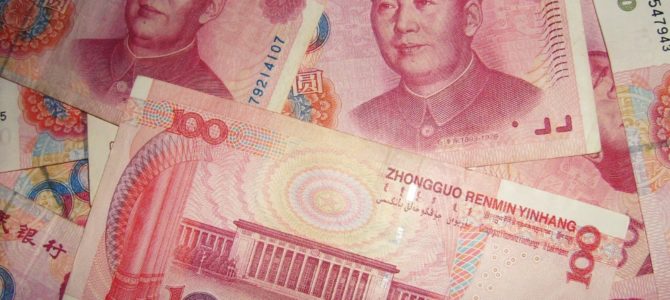
Communist China became the first major economy to create a government-sanctioned digital currency — digital yuan. Such a move will significantly impact the great power competition between the United States and China and may reshape the dollar-dominated global financial structure forever.
When Xi Jinping, the Chinese Communist Party General Secretary, talked about returning China to a world superpower status, he always envisioned China’s currency (the yuan) would achieve a global reserve currency status akin to what the U.S. dollar has enjoyed since the end of World War II.
The American dollar’s dominance in international financial structure has given the U.S. government tremendous political leverage, allowing it to carry out sanctions against foreign government officials and nation-states such as Iran and North Korea by cutting them off from the global banking system. For example, the Trump administration sanctioned Hong Kong executive Carrie Lam for suppressing Hong Kong’s pro-democracy movement and for helping Beijing imposing its draconian National Security Law on the city’s more than seven million residents. As a result of the U.S. sanctions, Lam lost access to global banking services and has been forced to stockpile cash.
Beijing has long viewed the dollar’s dominance as a threat to China’s economy and the nation’s global ambition. Since the 2008 global economic crisis, Beijing has embarked on a decade-long effort to promote the Chinese yuan in international trades and finance, hoping to eliminate “the U.S. dollar’s monopolistic position,” and seeking to make the yuan achieve a status paralleled with China’s growing economic and political power. One such move was to convince other nations participated in China’s global infrastructure project — the “Belt and Road” initiative — to settle trades and investments with the Chinese yuan.
Yet, despite the Chinese government’s relentless efforts, the Chinese yuan currently accounts for only 2 percent of global foreign exchange reserve assets while the dollar’s dominance remains unchallenged. Close to 90 percent of foreign-exchange transactions entail U.S. dollars, and more than 60 percent of all global central-bank reserves are held in dollar-denominated assets. China’s digital yuan, however, presents a challenge.
The Chance to Upend America’s Financial Dominance
Cryptocurrency has been around since 2008 after a mysterious figure named Satoshi Nakamoto launched bitcoin based on “blockchain” technology. Bitcoin exists only online, can be transferred digitally, and is finite. Furthermore, it’s not subject to government regulations when traded or spent, and you don’t need a bank to use it. While all the bitcoin trades and transactions are public information and recorded on a public ledger, bitcoin users remain anonymous.
Since the Chinese government imposes strict capital control on its citizens, bitcoin quickly became popular among Chinese “netizens.” As such, Beijing initially regarded bitcoin as a threat to its authoritarian state. Soon, however, Beijing realized a cryptocurrency such as bitcoin might provide the key to unseating the U.S. dollar’s dominant position and reshaping the international financial system.
Amid the COVID-19 pandemic last year, The Chinese government rolled out a digital yuan pilot program in several of its most tech-savvy cities, including Shenzhen, Shanghai, and Beijing. About 100,000 Chinese citizens could download an app from the central bank and spend a small amount of digital yuan allocated to them on items such as a cup of Starbucks coffee. Since the pilot program was successful, China’s central bank felt confident enough to roll out the digital yuan to the entire country this year.
The Unique Threat of a Chinese Cryptocurrency
Like every western technology adopted by China, the Chinese government sinicized digital yuan with “Chinese characteristics.” First, while users of any other cryptocurrencies in the rest of the world do not need a bank’s involvement to trade or spend their digital cash, digital yuan users must rely on China’s central bank as the middle man. China’s central bank controls when and how many digital yuan will be issued.
Second, users of digital yuan won’t be anonymous. The biggest attraction of any cryptocurrency is the anonymity of its users, yet Beijing regards user anonymity as a severe threat to its authoritarian regime. Indeed, by stripping away user anonymity the digital yuan is poised to become another powerful tool within the Chinese government’s ever-expansive state surveillance system — the CCP will instantly know who is buying what and where.
China currently deploys over 600 million facial recognition cameras to monitor its citizens. Since 2020, the Chinese government rolled out a comprehensive national social credit system to assess individuals and businesses on everything from trash placement to tax payment. Individuals and companies will either be rewarded for government-sanctioned good behaviors or punished for what the government deemed destructive behaviors.
Chillingly, there are real-life consequences for those who “misbehave.” Most likely, they will be subject to a travel ban, unable to book flights or train tickets; they can’t own a pet; they are subject to public shaming and have to pay hefty fines. The digital yuan, for example, will enhance the social credit system by punishing destructive behaviors by collecting fines instantly or preventing you from spending money in your account.
According to the Wall Street Journal, the third distinctive feature of the digital yuan is that the “money itself is programmable. Beijing has tested expiration dates to encourage users to spend it quickly, for times when the economy needs a jump-start.” In other words, the government will force you to use your money in the name of stimulating the economy for the “greater good” by making your cash worthless after a certain deadline. No other cryptocurrencies nor paper money issued by any other central bank has such a feature, and the digital yuan is a powerful new tool for the Chinese government to control its people and its economy on a whole new different level.
Removing Economic Sanctions as a Foreign Policy Tool
The biggest threat the digital yuan poses to the United States is that it presents an alternative to the existing international financial system America has led for two generations. Individuals under U.S. sanctions will avoid suffering any financial pain by using digital yuan to access their assets thus rendering typical economic sanctions toothless.
America’s adversaries, such as North Korea, Iran, and Russia, will likely use digital yuan to exchange money, settle trades, and engage in weapon sales or other illicit activities. Doing so will enable them to bypass the existing financial system entirely, meaning American intelligence agencies won’t be able to monitor such activities and hurting the ability of the United States and its allies to anticipate potential threats before they metastasize.
The digital yuan will also enhance China’s geopolitical and economic influence when more countries opt to use the digital yuan and become further economically dependent on Beijing. No wonder Josh Lipsky of the Atlantic Council think tank remarks, “Anything that threatens the dollar is a national-security issue. This [China’s digital yuan] threatens the dollar over the long term.”
Digital currency is the future and probably the not-so-distant future at that. A survey by the Bank of International Settlement in 2020 shows at least more than half of 60 central banks surveyed are exploring how to issue their digital currency. According to the Federal Reserve Chairman Jay Powell, however, the United States is studying the issue but “in no hurry to do anything.” But given the threat China’s digital yuan poses, Niall Ferguson, a Senior Fellow at Hoover Institute, warns that “U.S. policymakers need to wake up to the potential of digital currency and electronic payments and the peril of allowing China to dominate them.”
America’s Options
There are at least three things the United States should be doing in responding to the digital yuan. First, the Security and Exchange Commission should approve the existing requests to launch exchange-traded funds focusing on cryptocurrencies. Such funds will bring an inflow of fresh capital, stimulate the development of digital currencies and digital assets, and make them more accessible to the general public.
Second, the Fed should consider accepting some of these well-established cryptocurrencies into the U.S. financial system. Some well-known businesses such as Tesla and the Dallas Mavericks basketball team have already announced they would accept specific cryptocurrencies such as bitcoin or dogecoin as an alternative means of payment. As more businesses embrace digital currencies every week, the Fed may ultimately not have much choice but to adopt at least some type of digital currencies. If that’s likely to be the case, it’s better to do so now rather than later.
Finally, the Fed can issue a digital dollar as long as there are sufficient privacy protections in place to prevent some ambitious politicians from using the digital currency the way the CCP does as a means to control the American people.
Competition produces better goods and services at lower prices. The more free-market choices of digital currencies we can offer, the less likely China’s digital yuan will replace the U.S. dollar and gain international dominance as the CCP intended.









